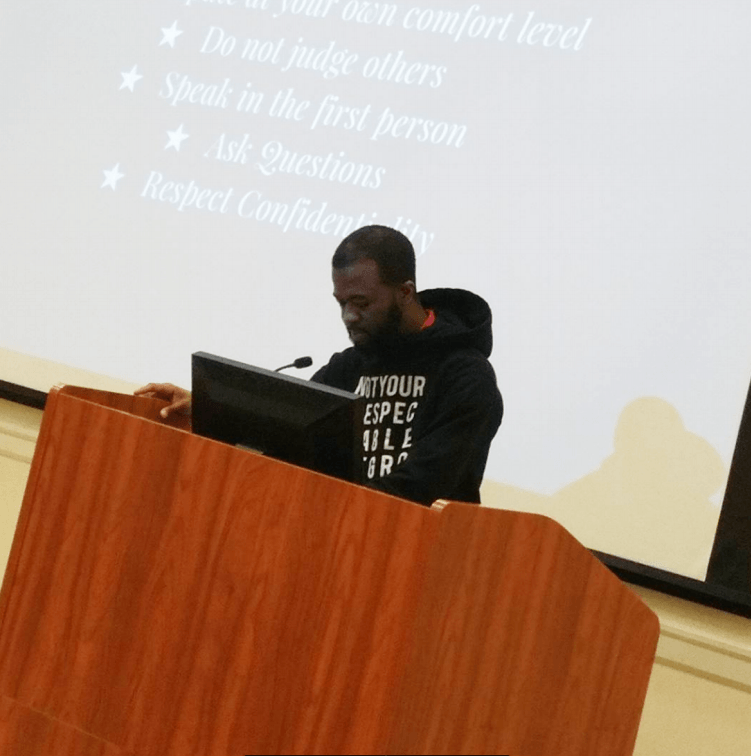Lecture on hip hop helps students understand mental illness stigma
3 min read
UMW Multi Center Twitter Page
By DANIELLE HOWARD
During his presentation, James Bland, an assistant director at the James Farmer Multicultural Center, elaborated on his love of hip hop and how the genre helped him to cope with his depression and make sense of the world around him as well as himself.
Hosted by the Diversity and Unity Coordinating Committee and the James Farmer Multicultural Center, Hip Hop Saved My Life discussed mental illness and the stigma that surrounds it. The event was hosted with the hope that the campus community would develop a better understanding of their role in limiting the perpetuation of unjust and inequitable practices associated with mental health, and, in turn, become advocates for those who have symptoms or have been diagnosed with mental illness.
“Before I had James Baldwin, Malcolm X or Martin Luther King Jr. as a conceptual framework to understand my blackness- I had 2Pac, Biggie, Lauryn Hill, and who I believe to be the greatest rapper of all time, Andre 3000,” said. Alongside Bland, Dr. Laura Mentore, a professor in the Department of Anthropology, spoke from her perspective as an anthropologist and applied her expertise to the misunderstandings that may cause stigma to arise.
“It may be that because of the way that society operates that the need for an out-group to be labeled as deviant has fallen to those with mental illness,” she said, “that they are viewed as non-conforming members of society.”
Mentore continued by relaying that the idea of mental illness is viewed differently based upon cultural and societal standards and influences.
“This was an enlightening experience that bridged anthropological theory together with something as relatable as hip hop and popular culture,” mentioned Zaire Sprowal, a senior physics major and member of the DUCC.
Both lecturers focused intently on the varying degrees to how stigma against mental illness adversely affects those diagnosed more than the actual symptoms themselves.
“It is the reaction and response that people have towards those exhibiting symptoms that can prohibit understanding and growth,” Mentore said.
Eventually both lecturers stated that it is possible that because hip hop is seen as a form of expression and a creative coping mechanism, its influence can also be tied to the way that hip hop rose as a genre that was mainly for rebelling against the standard. Even today, hip hop is viewed as one of the more “deviant” genres of music.
“I loved how reaffirming and relatable the information shared was,” said senior biology major Eugene Darfour. “As a fan of hip hop who views the genre as being positive and creative, it was nice to see it from an anthropological viewpoint and see how the two seemingly different subjects corresponded well together.”
“This was an amazing event,” said senior double major in sociology and women’s and gender studies Mariam Khan and fellow member of the DUCC
“It really helped me to understand my own frustration with why it’s difficult to talk about mental health in my community. It was also important to see the role that the society we live in plays into this stigmatization of mental health.”
Both Bland and Mentore urged audience members to expand and broaden their understanding of the subject, whether that meant listening to more Kendrick Lamar or reading more of Michel Foucault’s writings so that they, too, could better fight against stigma of mental health.












—-Lecture on hip hop helps students understand mental illness stigma???
Anyone who does not understand “stigma” has somehow missed the message of WW II.
It is a deep seated prejudice that allows multiple forms of discrimination.
As a mentally ill former UMW student, I appreciate this kind of activity at my alma mater. Although I’m personally more into electronic music than hip hop, I love both the idea of making mental illness more understandable to those without mental problems via music, and the idea of writing an article about it in The Blue and Gray Press. The reason that I appreciate the publicity for this is that I think prospective students need to see the very real efforts that UMW is making to become more tolerant and more diverse as a community…obviously, not every comment and not every article on this site does this as well as this article has.
By the way, in response to Harold A. Maio’s comment…I don’t believe that World War 2 was a fable with a moral or some other “message,” although certainly the world learned about the evils of Naziism and discrimination from the atrocities of WW2. Do you really believe that prejudice against the mentally ill, Jews, and many other groups simply evaporated after WW2, and that educational tools shouldn’t be use to help educate people about stigmatization?